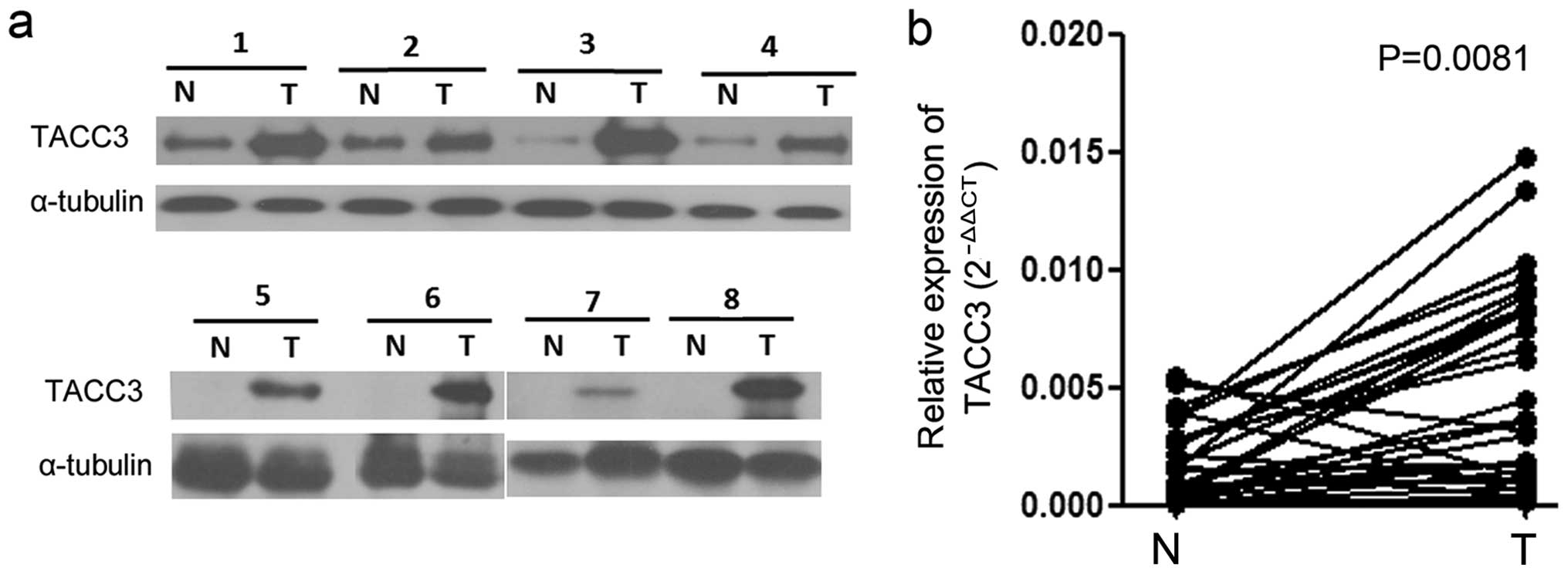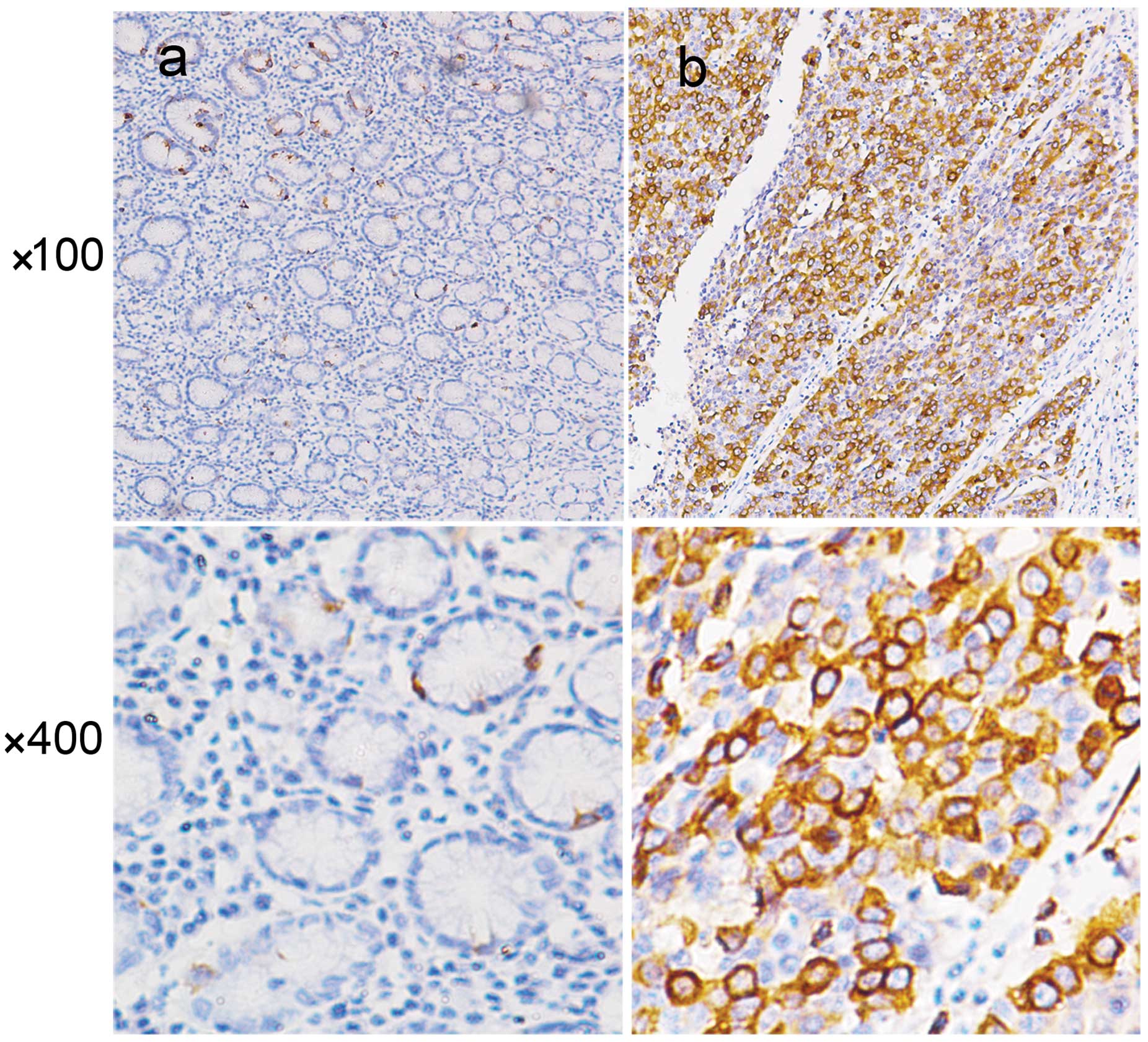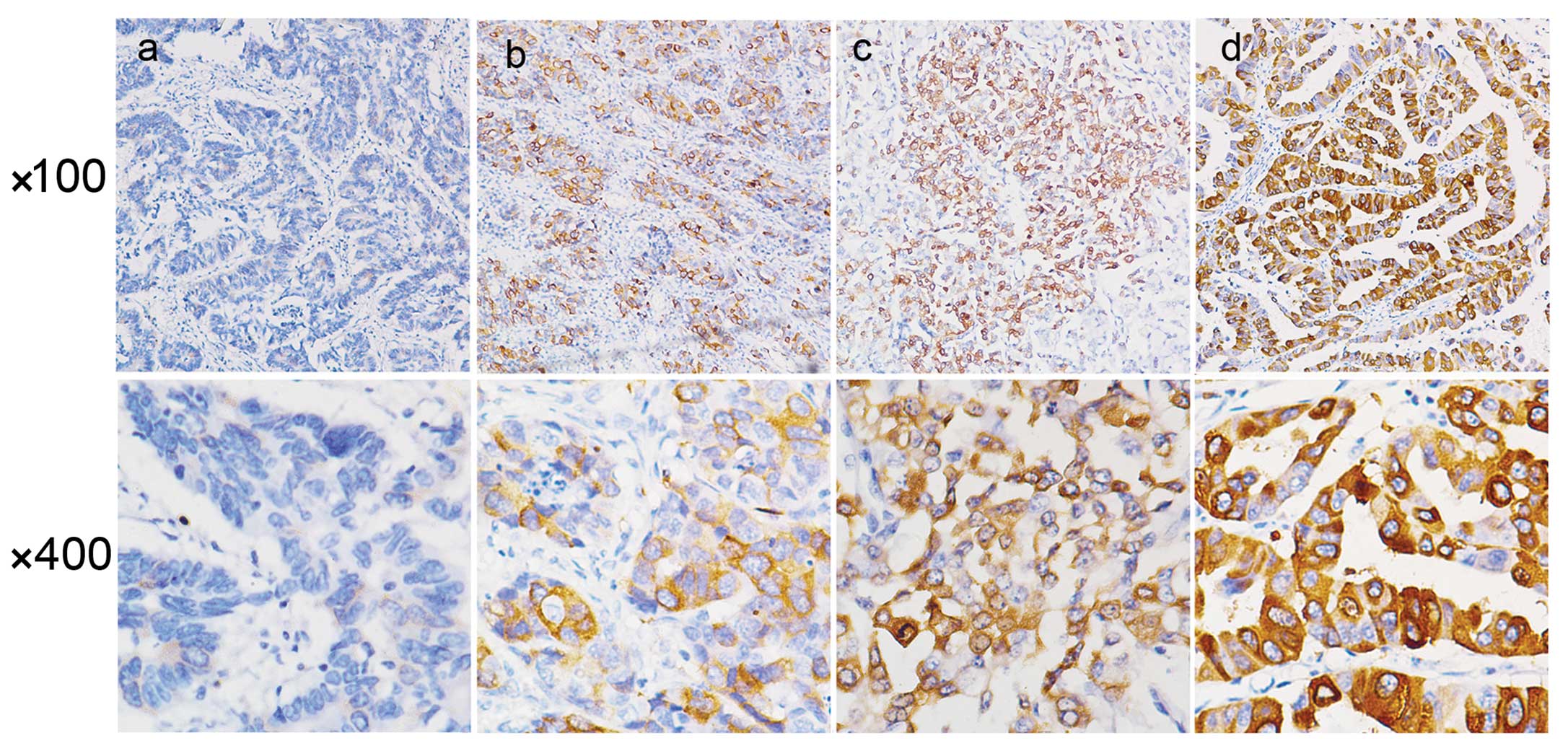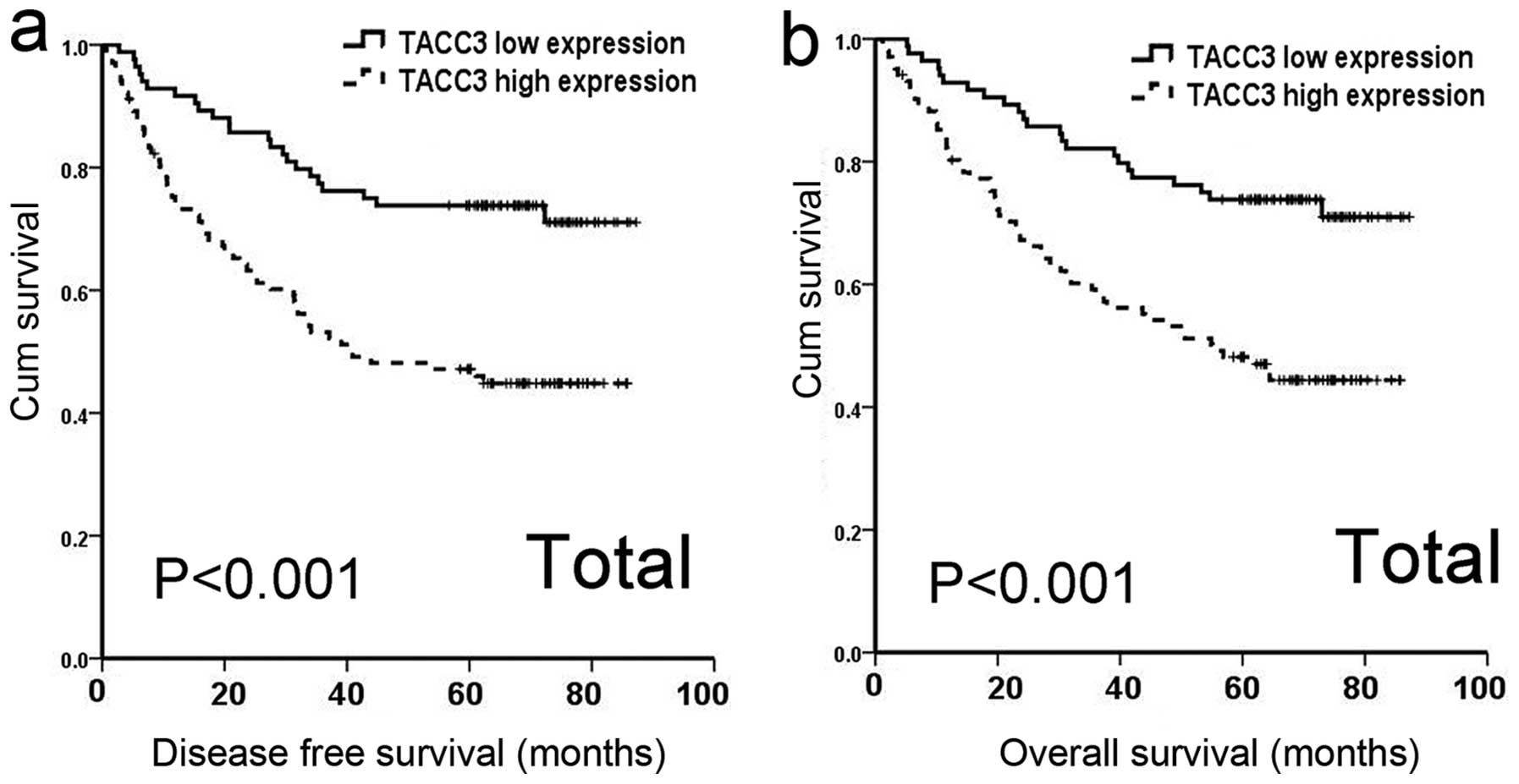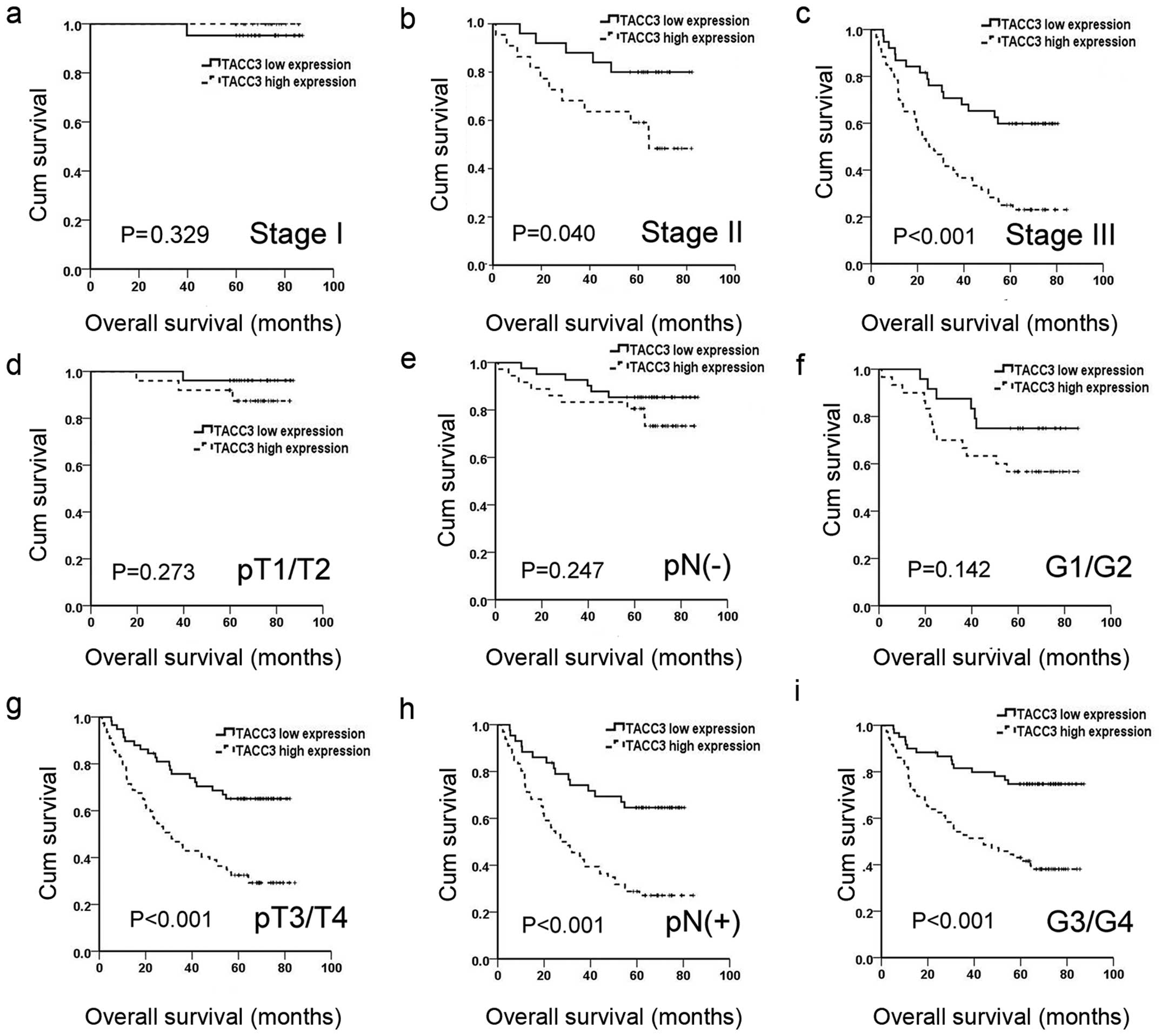|
1
|
Siegel R, Ma J, Zou Z and Jemal A: Cancer
statistics, 2014. CA Cancer J Clin. 64:9–29. 2014. View Article : Google Scholar : PubMed/NCBI
|
|
2
|
Theuer CP, Kurosaki T, Ziogas A, Butler J
and Anton-Culver H: Asian patients with gastric carcinoma in the
United States exhibit unique clinical features and superior overall
and cancer specific survival rates. Cancer. 89:1883–1892. 2000.
View Article : Google Scholar : PubMed/NCBI
|
|
3
|
Sasako M, Inoue M, Lin JT, Khor C, Yang HK
and Ohtsu A: Gastric Cancer Working Group report. Jpn J Clin Oncol.
40(Suppl 1): i28–i37. 2010. View Article : Google Scholar : PubMed/NCBI
|
|
4
|
Kellogg DR, Moritz M and Alberts BM: The
centrosome and cellular organization. Annu Rev Biochem. 63:639–674.
1994. View Article : Google Scholar : PubMed/NCBI
|
|
5
|
Pihan GA and Doxsey SJ: The mitotic
machinery as a source of genetic instability in cancer. Semin
Cancer Biol. 9:289–302. 1999. View Article : Google Scholar : PubMed/NCBI
|
|
6
|
Sen S: Aneuploidy and cancer. Curr Opin
Oncol. 12:82–88. 2000. View Article : Google Scholar : PubMed/NCBI
|
|
7
|
Sánchez-Pérez I, García Alonso P and Belda
Iniesta C: Clinical impact of aneuploidy on gastric cancer
patients. Clin Transl Oncol. 11:493–498. 2009. View Article : Google Scholar : PubMed/NCBI
|
|
8
|
Gómez-Baldó L, Schmidt S, Maxwell CA,
Bonifaci N, Gabaldón T, Vidalain PO, Senapedis W, Kletke A, Rosing
M, Barnekow A, et al: TACC3-TSC2 maintains nuclear envelope
structure and controls cell division. Cell Cycle. 9:1143–1155.
2010. View Article : Google Scholar : PubMed/NCBI
|
|
9
|
Albee AJ and Wiese C: Xenopus TACC3/maskin
is not required for microtubule stability but is required for
anchoring microtubules at the centrosome. Mol Biol Cell.
19:3347–3356. 2008. View Article : Google Scholar : PubMed/NCBI
|
|
10
|
Peset I and Vernos I: The TACC proteins:
TACC-ling microtubule dynamics and centrosome function. Trends Cell
Biol. 18:379–388. 2008. View Article : Google Scholar : PubMed/NCBI
|
|
11
|
Yao R, Natsume Y and Noda T: TACC3 is
required for the proper mitosis of sclerotome mesenchymal cells
during formation of the axial skeleton. Cancer Sci. 98:555–562.
2007. View Article : Google Scholar : PubMed/NCBI
|
|
12
|
Schneider L, Essmann F, Kletke A, Rio P,
Hanenberg H, Wetzel W, Schulze-Osthoff K, Nürnberg B and Piekorz
RP: The transforming acidic coiled coil 3 protein is essential for
spindle-dependent chromosome alignment and mitotic survival. J Biol
Chem. 282:29273–29283. 2007. View Article : Google Scholar : PubMed/NCBI
|
|
13
|
Kinoshita K, Noetzel TL, Pelletier L,
Mechtler K, Drechsel DN, Schwager A, Lee M, Raff JW and Hyman AA:
Aurora A phosphorylation of TACC3/maskin is required for
centrosome-dependent microtubule assembly in mitosis. J Cell Biol.
170:1047–1055. 2005. View Article : Google Scholar : PubMed/NCBI
|
|
14
|
Gergely F, Draviam VM and Raff JW: The
ch-TOG/XMAP215 protein is essential for spindle pole organization
in human somatic cells. Genes Dev. 17:336–341. 2003. View Article : Google Scholar : PubMed/NCBI
|
|
15
|
Gergely F, Karlsson C, Still I, Cowell J,
Kilmartin J and Raff JW: The TACC domain identifies a family of
centrosomal proteins that can interact with microtubules. Proc Natl
Acad Sci USA. 97:14352–14357. 2000. View Article : Google Scholar : PubMed/NCBI
|
|
16
|
Ha GH, Kim JL and Breuer EK: Transforming
acidic coiled-coil proteins (TACCs) in human cancer. Cancer Lett.
336:24–33. 2013. View Article : Google Scholar : PubMed/NCBI
|
|
17
|
L'Espérance S, Popa I, Bachvarova M,
Plante M, Patten N, Wu L, Têtu B and Bachvarov D: Gene expression
profiling of paired ovarian tumors obtained prior to and following
adjuvant chemotherapy: Molecular signatures of chemoresistant
tumors. Int J Oncol. 29:5–24. 2006.PubMed/NCBI
|
|
18
|
Ma XJ, Salunga R, Tuggle JT, Gaudet J,
Enright E, McQuary P, Payette T, Pistone M, Stecker K, Zhang BM, et
al: Gene expression profiles of human breast cancer progression.
Proc Natl Acad Sci USA. 100:5974–5979. 2003. View Article : Google Scholar : PubMed/NCBI
|
|
19
|
Jung CK, Jung JH, Park GS, Lee A, Kang CS
and Lee KY: Expression of transforming acidic coiled-coil
containing protein 3 is a novel independent prognostic marker in
non-small cell lung cancer. Pathol Int. 56:503–509. 2006.
View Article : Google Scholar : PubMed/NCBI
|
|
20
|
Yim EK, Tong SY, Ho EM, Bae JH, Um SJ and
Park JS: Anticancer effects on TACC3 by treatment of paclitaxel in
HPV-18 positive cervical carcinoma cells. Oncol Rep. 21:549–557.
2009.PubMed/NCBI
|
|
21
|
Ha GH, Kim JL and Breuer EK: TACC3 is
essential for EGF-mediated EMT in cervical cancer. PLoS One.
8:e703532013. View Article : Google Scholar : PubMed/NCBI
|
|
22
|
Ha GH, Park JS and Breuer EK: TACC3
promotes epithelial-mesenchymal transition (EMT) through the
activation of PI3K/Akt and ERK signaling pathways. Cancer Lett.
332:63–73. 2013. View Article : Google Scholar : PubMed/NCBI
|
|
23
|
Yao R, Natsume Y, Saiki Y, Shioya H,
Takeuchi K, Yamori T, Toki H, Aoki I, Saga T and Noda T: Disruption
of Tacc3 function leads to in vivo tumor regression. Oncogene.
31:135–148. 2012. View Article : Google Scholar
|
|
24
|
Kiemeney LA, Sulem P, Besenbacher S,
Vermeulen SH, Sigurdsson A, Thorleifsson G, Gudbjartsson DF, Stacey
SN, Gudmundsson J, Zanon C, et al: A sequence variant at 4p16.3
confers susceptibility to urinary bladder cancer. Nat Genet.
42:415–419. 2010. View
Article : Google Scholar : PubMed/NCBI
|
|
25
|
Seidl S, Kaufmann H and Drach J: New
insights into the pathophysiology of multiple myeloma. Lancet
Oncol. 4:557–564. 2003. View Article : Google Scholar : PubMed/NCBI
|
|
26
|
Birrer MJ, Johnson ME, Hao K, Wong KK,
Park DC, Bell A, Welch WR, Berkowitz RS and Mok SC: Whole genome
oligonucleotide-based array comparative genomic hybridization
analysis identified fibroblast growth factor 1 as a prognostic
marker for advanced-stage serous ovarian adenocarcinomas. J Clin
Oncol. 25:2281–2287. 2007. View Article : Google Scholar : PubMed/NCBI
|
|
27
|
Singh D, Chan JM, Zoppoli P, Niola F,
Sullivan R, Castano A, Liu EM, Reichel J, Porrati P, Pellegatta S,
et al: Transforming fusions of FGFR and TACC genes in human
glioblastoma. Science. 337:1231–1235. 2012. View Article : Google Scholar : PubMed/NCBI
|
|
28
|
Parker BC, Annala MJ, Cogdell DE, Granberg
KJ, Sun Y, Ji P, Li X, Gumin J, Zheng H, Hu L, et al: The
tumorigenic FGFR3-TACC3 gene fusion escapes miR-99a regulation in
glioblastoma. J Clin Invest. 123:855–865. 2013.PubMed/NCBI
|
|
29
|
Ha GH, Kim JL, Petersson A, Oh S, Denning
MF, Patel T and Breuer EK: TACC3 deregulates the DNA damage
response and confers sensitivity to radiation and PARP inhibition.
Oncogene. 34:1667–1678. 2015. View Article : Google Scholar
|
|
30
|
Zlobec I, Steele R, Terracciano L, Jass JR
and Lugli A: Selecting immunohistochemical cut-off scores for novel
biomarkers of progression and survival in colorectal cancer. J Clin
Pathol. 60:1112–1116. 2007. View Article : Google Scholar
|
|
31
|
D'Errico M, De Rinaldis E, Blasi MF, Viti
V, Falchetti M, Calcagnile A, Sera F, Saieva C, Ottini L, Palli D,
et al: Genome-wide expression profile of sporadic gastric cancers
with microsatellite instability. Eur J Cancer. 45:461–469. 2009.
View Article : Google Scholar
|
|
32
|
Still IH, Vince P and Cowell JK: The third
member of the transforming acidic coiled coil-containing gene
family, TACC3, maps in 4p16, close to translocation breakpoints in
multiple myeloma, and is upregulated in various cancer cell lines.
Genomics. 58:165–170. 1999. View Article : Google Scholar : PubMed/NCBI
|
|
33
|
Ulisse S, Baldini E, Toller M, Delcros JG,
Guého A, Curcio F, De Antoni E, Giacomelli L, Ambesi-Impiombato FS,
Bocchini S, et al: Transforming acidic coiled-coil 3 and Aurora-A
interact in human thyrocytes and their expression is deregulated in
thyroid cancer tissues. Endocr Relat Cancer. 14:827–837. 2007.
View Article : Google Scholar : PubMed/NCBI
|
|
34
|
Lauffart B, Vaughan MM, Eddy R, Chervinsky
D, DiCioccio RA, Black JD and Still IH: Aberrations of TACC1 and
TACC3 are associated with ovarian cancer. BMC Womens Health.
5:82005. View Article : Google Scholar : PubMed/NCBI
|
|
35
|
Angrisano T, Lembo F, Pero R, Natale F,
Fusco A, Avvedimento VE, Bruni CB and Chiariotti L: TACC3 mediates
the association of MBD2 with histone acetyltransferases and
relieves transcriptional repression of methylated promoters.
Nucleic Acids Res. 34:364–372. 2006. View Article : Google Scholar : PubMed/NCBI
|
|
36
|
Sadek CM, Pelto-Huikko M, Tujague M,
Steffensen KR, Wennerholm M and Gustafsson JA: TACC3 expression is
tightly regulated during early differentiation. Gene Expr Patterns.
3:203–211. 2003. View Article : Google Scholar : PubMed/NCBI
|
|
37
|
Fielding AB, Lim S, Montgomery K, Dobreva
I and Dedhar S: A critical role of integrin-linked kinase, ch-TOG
and TACC3 in centrosome clustering in cancer cells. Oncogene.
30:521–534. 2011. View Article : Google Scholar
|
|
38
|
Schmidt S, Schneider L, Essmann F, Cirstea
IC, Kuck F, Kletke A, Jänicke RU, Wiek C, Hanenberg H, Ahmadian MR,
et al: The centrosomal protein TACC3 controls paclitaxel
sensitivity by modulating a premature senescence program. Oncogene.
29:6184–6192. 2010. View Article : Google Scholar : PubMed/NCBI
|
|
39
|
Schneider L, Essmann F, Kletke A, Rio P,
Hanenberg H, Schulze-Osthoff K, Nürnberg B and Piekorz RP: TACC3
depletion sensitizes to paclitaxel-induced cell death and overrides
p21WAF-mediated cell cycle arrest. Oncogene. 27:116–125. 2008.
View Article : Google Scholar
|















